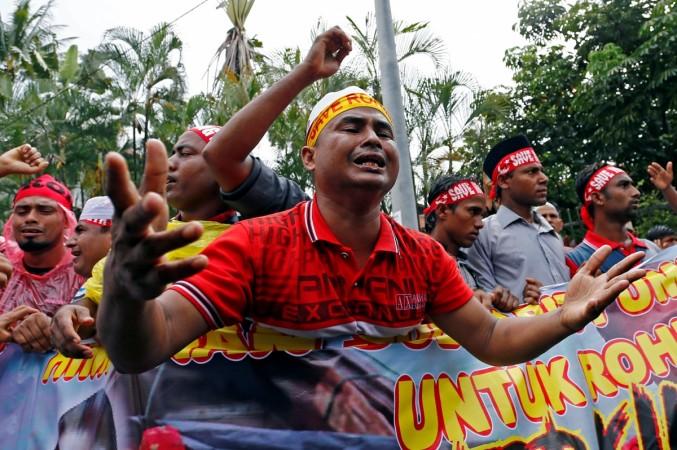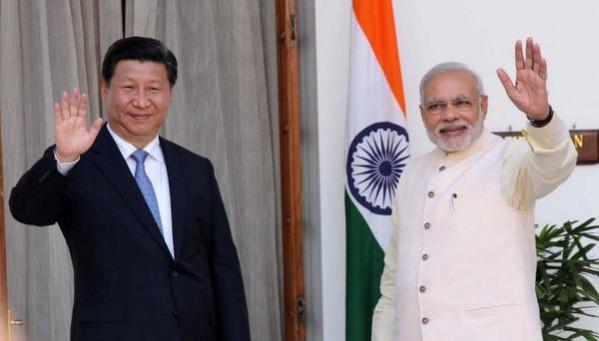
The Narendra Modi government at the Centre is under a lot of pressure over the Rohingya refugee crisis. While the NDA regime has expressed the desire to deport Rohingyas in India back to Myanmar where they have been oppressed by the rulers, the United Nations and human rights bodies have sharply criticised New Delhi over its stance. The government has tried to defend its position saying India's stance on enforcement of laws doesn't mean that it is lacking compassion.
The challenge for the Modi government is manifold and it is not easy for it to find an easy solution. When a small country like Bangladesh has also agreed to accommodate refugees from Myanmar and a country like Pakistan, not known for great human rights records, too, has lashed out at the oppression of the Rohingyas, India has found itself in a spot and not without a reason.
A country's foreign policy works in a given external milieu and India, which has always spoken for peace and harmony traditionally, has found its options limited in the current scenario. The reason is none other than China. One would actually find a parallel between India's policy vis-a-vis Nepal in the past with that vis-a-vis Myanmar now. In case of the Himalayan neighbour, India had traditionally backed the now defunct monarchy as well as the democratic forces to keep the Maoists at bay so that their ideological allies in China did not get an advantage in strategic affairs related to Kathmandu.
When China is backing Myanmar rulers, India can't afford to do otherwise
The story is somewhat similar with Myanmar today. India was once a staunch critic of the eastern neighbour's military junta but as new Delhi started pursuing the Look East and subsequently the Act Policy policies, Naypitaw became strategically significant for South Block to reach out to South-east Asia which is home to the Association of Southeast Asian Nations or Asean. Also, India saw that keeping Myanmar at bay could see serious geostrategic losses since China has worked seriously to grow closer to it to eventually facilitate its Belt and Road Initiative (BRI) and get more access to South Asia to put India under more stress.
China, on its part, has also prioritised geostrategy over humanitarian concerns. It has backed the Myanmar rulers in its handling of the Rohingya issue because, as a Myanmarese analyst has said, its concerns over the Rakhine state are more related to the BRI. Rakhine has significance for BRI for it provides an exit to the Indian Ocean and also is the venue for big Chinese projects and Beijing would not want its stability to be shaken. And with China not risking its economic plan even when innocent human beings are being put to the swords, there is little surprise that India would do it either. It is after all locked in a serious strategic warfare with the Chinese in its own vicinity.

Myanmar will make use of the sympathies of both China and India to its own advantage, just like Nepal is known to do. A non-democratic China will also have little resistance to tackle at home. It is India which will have the real test since taking a hard stance on the refugee issue is not in tune to its traditional peace-seeking foreign policy and the fact that it is a noisy democracy and already home to several thousands of Rohingyas will create stiff opposition both at home and abroad. The Modi government will have to do some serious thinking to find an exit route, keeping in mind both the humanitarian and national security perspectives.
'Politically insignificant' northeast also not helping things
Another important angle in the story is that Myanmar borders one of India's most 'politically insignificant' region. It means none of the Indian states that border Myanmar have the a clout strong enough to put pressure on New Delhi on its foreign policy decision-making. For example, in the past, the state rulers of Tamil Nadu had a serious impact on India's relations with Sri Lanka in connection with the Tamils of the island-state who were oppressed by the majoritarian Sinhalese. Similarly, West Bengal Chief Minister Mamata Banerjee is having a big say on the Teesta water-sharing treaty between India and Bangladesh.
New Delhi has not been able to turn a blind eye towards humanitarian or other problems at the borders and take unilateral decisions. But with regard to Myanmar, the Centre has considered mostly the issue of security threat and gone about in a more bureaucratic way to handle it. Had there been a powerful non-BJP chief minister in any of the states bordering Myanmar having a say on the crisis, there would have been more deliberations than any straightforward policy decision.













